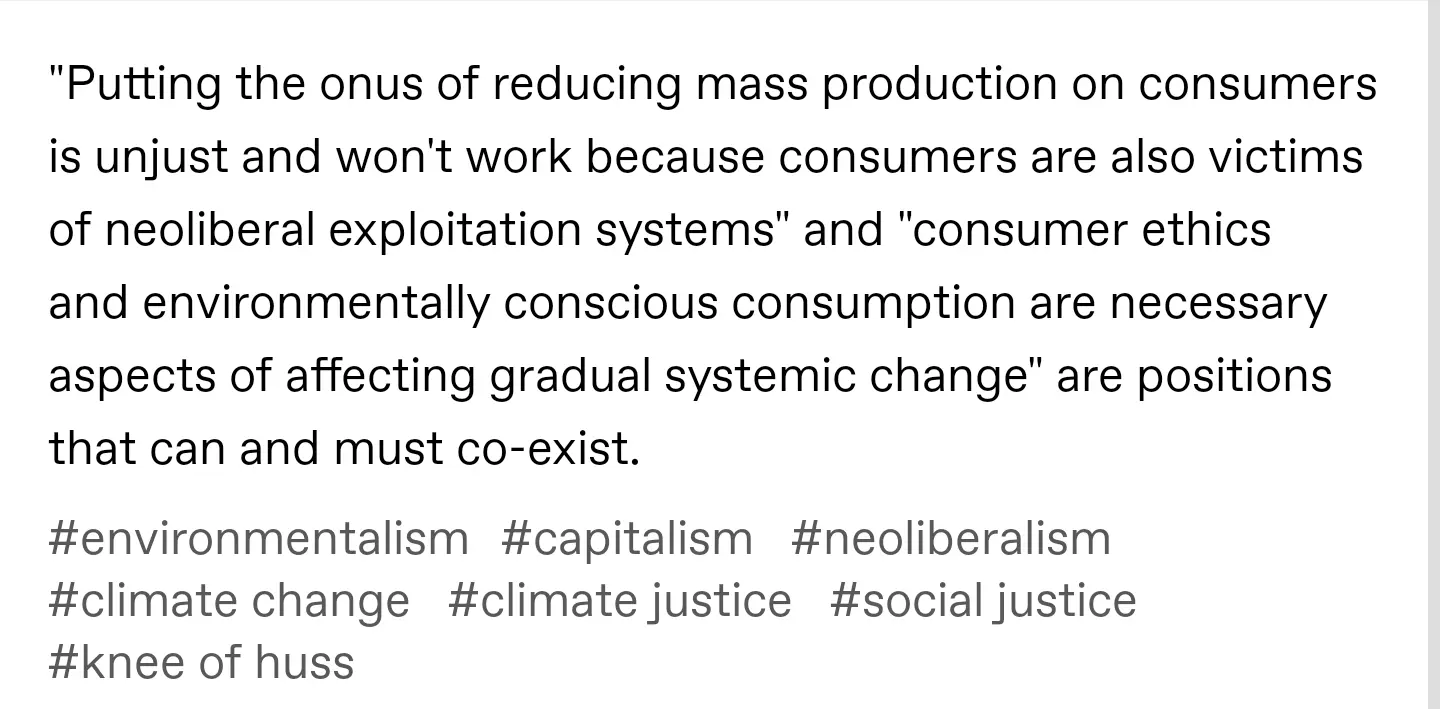this post was submitted on 26 Sep 2023
245 points (93.6% liked)
Solarpunk
6928 readers
34 users here now
The space to discuss Solarpunk itself and Solarpunk related stuff that doesn't fit elsewhere.
Join our chat: Movim or XMPP client.
founded 3 years ago
MODERATORS
you are viewing a single comment's thread
view the rest of the comments
view the rest of the comments

I'll start out with the most damning response to the "footprint" concept: carbon footprint is almost entirely dictated by your income.
The logic that consumer behaviour puts pressure on corporations is based on the logic of supply & demand based pricing.
The problem is, that's an article of faith and not really supported by the evidence. When you put that theory to the test the evidence shows that pricing follows a model where companies effectively dictate their prices to you. It doesn't follow supply and demand.
This is an interview of two economists on this topic: https://www.iheart.com/podcast/105-it-could-happen-here-30717896/episode/everyone-else-admits-we-were-right-122933018/
They also skewer the whole institution of orthodox economics here. I found it quite cathartic.
But the upshot of this is, in my opinion, the only way to reduce your personal carbon footprint is to make yourself "poor" at least as far as the economy is concerned. That may sound impossible, but I think it dovetails nicely with my own politics of building mutual aid networks, where people create alternative methods of directly meeting one another's needs and help wean one another off our dependence on capital and the state.
That isn't consumer activism as much as it is anti-consumer, and that's kind of incidental to its primary goal to create a political body that undermines the entire machinery of capitalism whilst educating common people on how to run a world for and by themselves.
I think I'd quite like to try out a society that praised things like humility, modesty, selflessness
and vilified things like, gluttony, vanity. envy, pride, greed.
I'm not sure where i'm going to find one of those - it'd probably get attacked by some international agency that claims to have intelligence.
That's why part of the key is autonomous on the ground activity that is not on the surface a direct threat to them - although it should be openly aspiring to become a threat. The more we make up of the ecosystem the owning class depends on for support, the less feasible it becomes for them to attack us, until we eventually grow around their entire root system and choke it out.
I'd agree with your politics there, too. The poorer you make yourself, the more likely you are to live a moral life. Unfortunately, it's very difficult to also make it a good, comfortable, safe life, and I think it's a bit much to ask people to go that much against their own interests. (This varies from country to country of course, I'm sure there's places where you'd be ok)
Their "own interests"
this is a key phrase here for me.
Once a person has a modest amount; is it in their interests to eat more and get fat, or to live in a place where other people share in having a modest amount, or, at least have a fair oppotunity to get a modest amount.
A person's morality will influence the scope of their concept of "own interests".
And therefore how much they want beyond meeting their "own basic needs" before they start caring more about neighbours with unfulfilled "basic needs".
I fully agree. I just think that the economic situations have been getting more and more precarious for lots of people, meaning getting to a modest amount moves further into the distance. I truly believe that we'll have more people championing climate change issues if we put them in positions where fulfilling their own needs is easier
Part of the point of the mutual aid is to make life better without needing the money. That's why I put "poor" in quotations and specified in the eyes of the economy.
Fair, I should have made the effort to use "poor" in quotations, too. I love the idea of mutual aid working that way. I guess I'd be worried about relying on it for anything as potentially life-or-death as healthcare, but that's a few steps further down the line than we're discussing here
Yeah, you take the steps you can when you can. The ultimate point is to create a real alternative to the existing power structure. The anti consumerism is a by-product.
Edit: maybe the anti-consumerism is necessarily interwoven in the project, because you are freeing yourself from reliance on consumer goods and from the entire consumer identity.